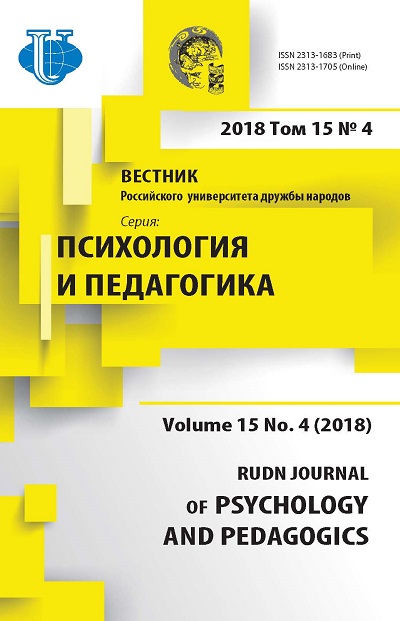Spiritual Capacities and Productive Life Activity of the Family
- Authors: Ozhiganova G.V1
-
Affiliations:
- Institute of Psychology of Russian Academy of Sciences
- Issue: Vol 15, No 4 (2018)
- Pages: 395-409
- Section: PERSONALITY AND SOCIAL PSYCHOLOGY
- URL: https://journals.rudn.ru/psychology-pedagogics/article/view/20370
- DOI: https://doi.org/10.22363/2313-1683-2018-15-4-395-409
Cite item
Full Text
Abstract
In the article the role of spiritual factors in the productive life activity of the family is considered. A particular attention is given to the description of the construct “spiritual capacities”. The influence of a moral aspect of motivation, value orientations on the satisfaction with marriage, the success of the family life is analyzed. It is shown that the family well-being is promoted by the moral motives of marriage, spiritual value orientations related to the awareness of the meaning of life, selfimprovement, altruism. The importance of spiritual capacities and spiritual orientation for the family productive life activity is noted. The detailed descriptions of such spiritual capacities as moral, reflexive, self-regulatory, creative, which the author attributes to the category of the higher ones, are given. These capacities make it possible to lay a solid moral foundation for the family relations and the successful upbringing of children, create the opportunity for the creative development, the manifestation of wisdom and spiritual self-improvement of the family members. It is emphasized that a healthy, happy family can be considered as the result of the productive life activity of its members, aimed at maintaining and developing the family. A productive life activity of the family can be also related to the success and productivity of its members in the field of educational, professional and other activities. In both cases, spiritual capacities can serve as a guarantor of the wellbeing and the productive life activity of the family.
About the authors
Galina V Ozhiganova
Institute of Psychology of Russian Academy of Sciences
Author for correspondence.
Email: symposium2016@rambler.ru
Ph.D. in Psychology, senior researcher, Laboratory of Psychology of Abilities and Mental Resources, Institute of Psychology of Russian Academy of Sciences (Moscow, Russia).
13 Yaroslavskaya St., Moscow, 129366, Russian FederationReferences
- Andreeva, T.V. (2005). Psikhologiya sovremennoi sem’i. Saint Petersburg: Rech. Publ. (In Russ.)
- Bachinina, K.S., & Ershova, I.A. (2013). Issledovanie udovletvorennosti brakom i cennostnye orientacii u suprugov so stazhem braka do 5 let. Izvestiya Ural’skogo federal’nogo universiteta. Seriya 1: Problemy obrazovaniya, nauki i kul’tury, 116(3), 120—128. (In Russ.)
- Chebotareva, E.Yu. (2016). Tcennostnye orientacii i ustanovki k semeinoi zhizni v yunosheskom i zrelom vozraste. In Bazarova, G.T. (Ed.). Ot individa k sisteme: konsul’tirovanie i psikhoterapiya (pp. 113—125). Moscow: Pero Publ. (In Russ.)
- Chebotareva, E.Yu., & Jaber, H.M.A. (2017). Life values of persons in cross-cultural (Arab-Russian) and monocultural marriages and their representation in family sphere. RUDN Journal of Psychology and Pedagogics, 14(3), 311—325. doi: 10.22363/2313-1683-2017-14-3-311-325
- Elizarov, A.N. (1995). Tcennostnye orientacii neblagopoluchnyh semei. Sociologicheskie issledovaniya, (7), 93—99. (In Russ.)
- Federal’naya sluzhba gosudarstvennoi statistiki. Braki i razvody. Available at: http://www.gks.ru/wps/ wcm/connect/rosstat_main/rosstat/ru/statistics/population/demography/# (accessed: 5 September 2018). (In Russ.)
- Gao, Y., Shi, J., Niu, Q., & Wang, L. (2013). Work-Family Conflict and Job Satisfaction: Emotional Intelligence as a Moderator. Stress and Health, 29(3). Available at: https://www.researchgate.net/ publication/231214960_Work-Family_Conflict_and_Job_Satisfaction_Emotional_Intelligence_ as_a_Moderator (accessed: 5 September 2018).
- Golod, S.I. (1977). Social’no-psikhologicheskie i nravstvennye tcennosti sem’i. Molodaya semya, (18), 41—56. (In Russ.)
- Golod, S.I. (1984). Stabil’nost’ sem’i: socialogicheskii i demograficheskii aspekty. Leningrad: Nauka Publ. (In Russ.)
- Goltcova, E.V. (2018). Brachnoe povedenie molodyozhi goroda Irkutska i ego determinaciya. Sociodinamika, (1), 1—14. doi: 10.25136/2409-7144.2018.1.25108. Available at: http://e-notabene. ru/pr/article_25108.html (accessed: 10 August 2018). (In Russ.)
- Hanson, B.G. (2013). General systems theory beginning with wholes. NY: Routledge.
- Harchev, A.G., & Matckovskii, M.S. (1978). Sovremennaya sem’ya i ee problemy. Moscow: Statistika Publ. (In Russ.)
- Ivanov, A.V. (2014). Kul’turnaya sreda sem’i kak uslovie produktivnogo vospitaniya lichnosti. Vestnik MGOU. Seriya: Pedagogika, (2), 103—111. (In Russ.)
- Kamneva, N.A. (2009). Motivaciya vstupleniya v brak i ee vliyanie na konfliktnye situacii budushchei molodoi sem’i. Vestnik TGU, 2(70), 271—276. (In Russ.)
- Laktyuhina, E.G., & Antonov, G.V. (2016). Prichiny razvoda v sovremennoi Rossii. Narodonaselenie, (4), 57—67. (In Russ.)
- Martins, L.L., Eddleston, K.A., & Veiga, J.F. (2002). Moderators of the relationship between workfamily conflict and career satisfaction. Academy of Management Journal, 45(2), 399—409.
- Namayandeh, H., Juhari, R., & Yaacob, S.N. (2011). The Effect of Job Satisfaction and Family Satisfaction on Work — Family Conflict (W-FC) and Family — Work Conflict (F-WC) among Married Female Nurses in Shiraz, Iran. Asian Social Science, 7(2), 88—95.
- Ozhiganova, G.V. (2016). Duhovnye sposobnosti kak resurs zhiznedeyatel’nosti. Moscow: Institut psikhologii RAN Publ. (In Russ.)
- Pleck, J.H. (1977). The work-family role system. Social Problems, 24(4), 417—427.
- Rao, T.S.S., & Indla, V. (2010). Work, family or personal life: Why not all three? Indian J Psychiatry, 52(4), 295—297. doi: 10.4103/0019-5545.74301
- Redding, S. (1992). Family values, the curriculum of the home, and educational productivity. The School Community Journal, 2(1), 62—69.
- Rogova, A.M. (2007). Osobennosti formirovaniya semejnyh cennostei u sovremennoi rossijskoi molodezhi. Sovremennye problemy nauki i obrazovaniya, (1), 66—69. (In Russ.)
- Satir, V. (1992). Kak stroit’ sebya i svoyu sem’yu. Moscow: Pedagogika-press Publ. (In Russ.)
- Semenov, V.E. (2013). Duhovno-nravstvennoe vospitanie kak vazhneishii nacional’nyi proekt v sovremennoi Rossii. In Koltcova, V.A. (Ed.). Social’no-psikhologicheskie i duhovno-nravstvennye aspekty sem’i i semeinogo vospitaniya v sovremennom mire (pp. 173—177). Moscow: Institut psikhologii RAN Publ. (In Russ.)
- Sysenko, V.A. (1989). Supruzheskie konflikty. Moscow: Mysl’ Publ. (In Russ.)
- Tsvetkova, N.A. (2015). O soglasovannosti semejnyh cennostej i rolevyh ustanovok v supruzheskoj pare sovremennogo megapolisa. In Mahnach, A.V. & Zueva, K.B. (Eds). Sem’ya, brak i roditel’stvo v sovremennoi Rossii, 2 , 140—145. (In Russ.)
- Yurkevich, N.G. (1970). Sovetskaya sem’ya: funkcii i usloviya stabil’nosti. Minsk: Belarus State University Publ. (In Russ.)
- Zhuravlev, A.L. (2005). Psikhologiya sovmestnoi deyatel’nosti. Moscow: Institut psikhologii RAN Publ. (In Russ.)















